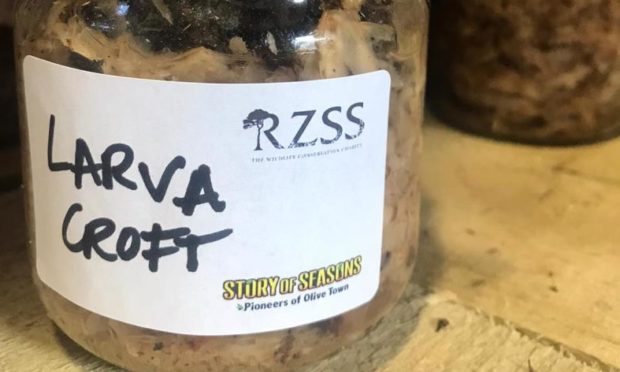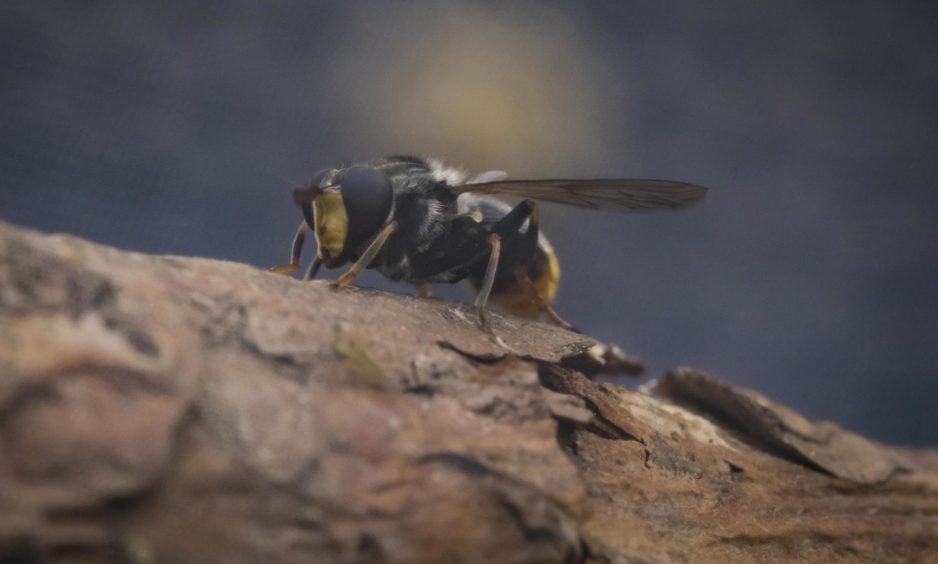One of the UK’s rarest species is heading for a record-breaking breeding season in the Highlands, its last remaining habitat.
Keepers at the Royal Zoological Society of Scotland (RZSS) are caring for more critically-endangered pine hoverflies than ever before at the Highland Wildlife Park at Kincraig.
The species, which plays an important role in the ecosystem as a pollinator, is so rare in the UK that no one has seen an adult pine hoverfly in the wild for more than eight years.
The breeding programme at the wildlife park is now responsible for the majority of Britain’s known population of the native species, currently only found in one small forest in the Cairngorms.
Almost all of the 156 larvae that hatched at the park last year are now becoming pupae, entering the next stage of their life cycle on their way to becoming adults.
Among them are ‘Larva Croft’ and ‘Pine-al Ritchie’, named by fans of project-funder Marvelous Europe Limited, publisher of the farming simulation game Story of Seasons: Pioneers of Olive Town, which has donated £20,000 to the conservation programme.
Best hope for the species
In previous breeding cycles at the park, the most pine hoverfly larvae that pupated was 13. This year there are already 130 pupae, with more being discovered every day.
Dr Helen Taylor, conservation programme manager at RZSS said: “Our charity’s conservation breeding programme at Highland Wildlife Park is currently the best hope for the survival of this critically endangered species.
“Every individual matters, so it is really exciting to have more larvae pupating than ever before and nerve-wracking to have to wait and see how many complete the full cycle, from egg, to larva, to pupa, to adult.
“The process they go through is extraordinary. Inside the pupa case, these animals are breaking most of their body down into goo and then totally reassembling it to transition from a larva to an adult fly. Most people will be familiar with this idea from caterpillars turning into butterflies, but it really is a magical transformation.”
“Invertebrates are a fundamentally under-studied, under-acknowledged and under-loved group of animals that fuel the food chain, pollinate plants and break down organic waste. They hold our ecosystems together, making them an important focus for conservation efforts. Without them, the world would be very different.”
What happens next?
Next steps for the project include moving the pupae in the coming weeks into a new purpose-built breeding centre which is supported by Marvelous Europe, The National Geographic Society, Cairngorms National Park Authority, Forestry and Land Scotland, and NatureScot.
The pine hoverfly conservation breeding programme is led by RZSS in collaboration with the Rare Invertebrates in the Cairngorms project, a partnership between the RSPB, Cairngorms National Park Authority, Buglife Scotland, Butterfly Conservation Scotland, and NatureScot.
Pine hoverflies became critically endangered in Britain due to land use change resulting in the loss of the ancient pine forests.

